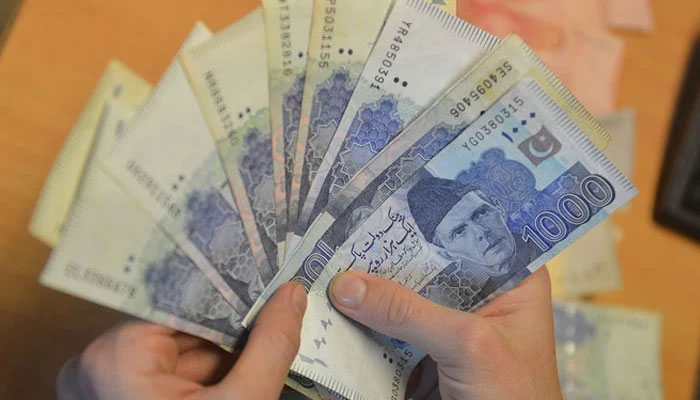Foreign inflows into T-A money changer counts Pakistan's currency at a market in Karachi
KARACHI: Foreign investment in Pakistan’s short-term government debt securities reached a four-year high in the fiscal year 2024, as high interest rates, a stable currency, and the anticipation of a new bailout from the International Monetary Fund (IMF) enticed overseas investors to pour their funds into T-bills.
Data from the State Bank of Pakistan showed on Thursday that the country received $581 million in net dollar inflows into T-bills through special convertible rupee accounts (SACRA) in the last fiscal year, which ended on June 30. This represents the second-largest level on record. In June alone, these inflows amounted to $194 million. In the fiscal year 2020, the net T-bills inflows of $612 million came into Pakistan, with the highest amount seen in January 2020, reaching the net monthly inflows of $1.4 billion, according to Topline Securities.
In FY24, net inflows via SCRA increased significantly to $679 million, marking the highest level since FY15, said Arif Habib Limited. This total includes $90 million in equity, the highest net inflow since FY15, and more than $500 million in T-bills, the most substantial net inflow since FY20.
These impressive inflows are largely attributable to a stable exchange rate, elevated interest rates, exceptional corporate profitability, and improving macroeconomic conditions within the country during this period, it said.
Analysts identify a few causes for the large inflow of foreign funds into Pakistan’s government bonds denominated in rupees.“The reason for foreigners returning to Pakistan’s debt market is that Pakistan is no longer perceived as being at high risk of default, and higher interest rates are being offered by government securities amid currency stability,” said Awais Ashraf, director research at AKD Securities Limited.
“Moreover, the completion of the key electoral cycle and the new cabinet’s renewed commitment to a fresh IMF programme has opened the door to market normalization,” Ashraf said.“Credibility in this push for a new IMF programme is boosted by the successful implementation of the previous one in 2023-2024,” he added.
Pakistan completed a short-term $3 billion IMF stand-by arrangement in April that helped prevent a sovereign debt default.Interest rates were lowered last month for the first time in four years due to the beginning of a decrease in inflation amid tight policies and slow growth. Last month, the SBP cut its benchmark interest rate by 150 basis points to 20.5 per cent after maintaining it at a record 22 percent since July 2023.
Given that Pakistan has reached a new $7 billion loan deal with the IMF, there is likelihood that more hot money or foreign funds will come to the country to purchase high-yielding government papers, supporting the local currency and foreign exchange reserves in the short run.Recent reports from Moody’s and Fitch over the past few days have provided encouraging remarks on the finalization of the IMF deal. However, they also emphasized the need to continue reforms to ensure sustainable economic growth. Both agencies expect inflation to gradually recede and interest rates to decline in the coming months, said Chase Securities in a note.
-
 Horrifying Pictures Of The Kidnapper Of Savannah Guthrie's Mother Released
Horrifying Pictures Of The Kidnapper Of Savannah Guthrie's Mother Released -
 Andrew's Ex-girlfriend Launches Brazen Attack On Epstein Victims On Piers Morgan Show
Andrew's Ex-girlfriend Launches Brazen Attack On Epstein Victims On Piers Morgan Show -
 Andrew Mountbatten-Windsor 'on His Own' As Palace Gives Green Light To Law Enforcement
Andrew Mountbatten-Windsor 'on His Own' As Palace Gives Green Light To Law Enforcement -
 Kanye West's Tweet About Super Bowl Halftime Resurfaced After Bad Bunny's Show
Kanye West's Tweet About Super Bowl Halftime Resurfaced After Bad Bunny's Show -
 'FBI' Star Juliana Aidén Martinez Tease Her Return To 'Law And Order: SVU' After Quitting
'FBI' Star Juliana Aidén Martinez Tease Her Return To 'Law And Order: SVU' After Quitting -
 Cardi B's Emotional Words To Pal Amid Stefon Diggs Rumored Breakup Revealed
Cardi B's Emotional Words To Pal Amid Stefon Diggs Rumored Breakup Revealed -
 Princess Eugenie Breaks Cover Amid Explosive Family Scandal
Princess Eugenie Breaks Cover Amid Explosive Family Scandal -
 Will Kate And Anthony Have 'Bridgerton' Spin Off? Revealed
Will Kate And Anthony Have 'Bridgerton' Spin Off? Revealed -
 Schoolgirl Eaten Alive By Pigs After Brutal Assault By Farmworker
Schoolgirl Eaten Alive By Pigs After Brutal Assault By Farmworker -
 King Charles’ Statement About Epstein Carries A Secret Meaning: Here’s Why It Can Be An Invite To Police
King Charles’ Statement About Epstein Carries A Secret Meaning: Here’s Why It Can Be An Invite To Police -
 Demi Lovato Delivers Heartbreaking Message To Fans About Her Concerts
Demi Lovato Delivers Heartbreaking Message To Fans About Her Concerts -
 Sweden's Princess Sofia Explains Why She Was Named In Epstein Files
Sweden's Princess Sofia Explains Why She Was Named In Epstein Files -
 Activist Shocks Fellow Conservatives: 'Bad Bunny Is Winner'
Activist Shocks Fellow Conservatives: 'Bad Bunny Is Winner' -
 Noel Gallagher Challenges Critics Of Award Win To Face Him In Person
Noel Gallagher Challenges Critics Of Award Win To Face Him In Person -
 Minnesota Man Charged After $350m IRS Tax Scam Exposed
Minnesota Man Charged After $350m IRS Tax Scam Exposed -
 Meghan Markle 'terrified' Over Possible UK Return
Meghan Markle 'terrified' Over Possible UK Return




